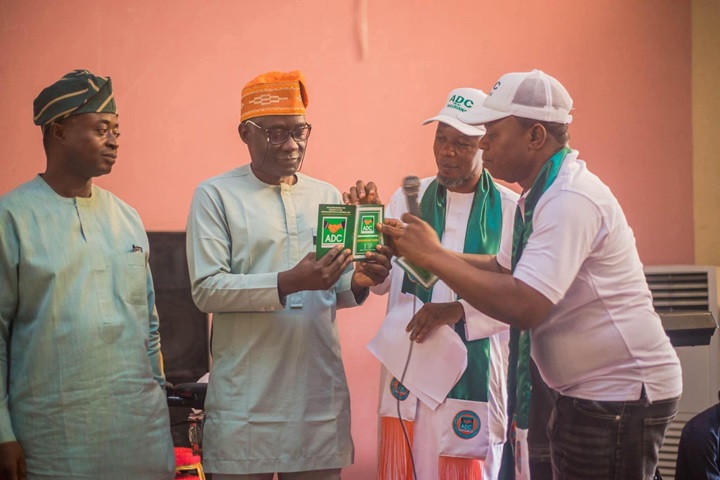In a bold political realignment, high-profile politicians from the PDP, Labour Party, and APC defected to the ADC on Friday in Ado-Ekiti.
This strategic move signals a major shift ahead of the 2026 and 2027 elections.
Among the defectors are two former deputy governors, Prof. Olusola Eleka and Dr. Tae Lawal, who left the PDP citing ADC’s commitment to good governance.
Former Speaker Boyega Aribisogan and ex-SSG Amb. Dare Bejide also joined the coalition, strengthening ADC’s credibility.
Additionally, Akin Omole, a former commissioner under Governor Fayemi, and several local government appointees pledged support.
The unveiling ceremony drew enthusiastic crowds, reflecting growing momentum for the party.
ADC Chairman Hon. Omolayo Ilesanmi welcomed the defectors, praising their courage and vision.
He emphasized ADC’s core values of integrity, transparency, and disciplined leadership.
“ADC has come to stay,” he declared, urging members to remain resolute in building a better Nigeria.
The event also featured solidarity messages from national leaders like Senator David Mark.
Prof. Bayo Fakunle, representing Atiku Abubakar, described ADC as “a moving train” unstoppable in its mission.
He highlighted the party’s potential to redefine governance in Ekiti and beyond.
With these defections, ADC gains experienced leaders capable of mobilizing grassroots support.
The coalition now poses a serious challenge to dominant parties in the state; consequently, political dynamics are shifting significantly.
Analysts suggest that this development could reshape Ekiti’s political landscape, particularly as the 2026 gubernatorial race approaches.
Moreover, ADC’s growing influence reflects widespread public dissatisfaction with traditional parties, which have struggled to meet citizens’ needs.
As more defectors join, the party’s structure and outreach continue expanding, thereby enhancing its overall presence in the region.
Key figures like Eleka and Aribisogan contribute strategic experience to the coalition, which strengthens its position in the political arena.
Furthermore, the defectors have vowed to prioritize development, accountability, and inclusive governance, signaling a shift in focus.
Their move clearly indicates a rejection of what they call “failed leadership” in Ekiti, resonating with frustrated voters.
In addition, ADC’s emphasis on unity and progress appeals to voters seeking viable alternatives to established parties.
The party plans aggressive grassroots campaigns aimed at consolidating its gains ahead of the upcoming elections, ensuring visibility.
Political observers note that ADC’s rising profile could potentially trigger further defections from other parties, increasing its influence.
Ultimately, the coalition’s ability to attract seasoned politicians demonstrates its viability, which could reshape future elections.
However, success will depend on sustained mobilization and a clear policy direction to maintain momentum and support.
For now, ADC’s momentum suggests a competitive race in 2026, making the political landscape increasingly unpredictable.
As Ekiti’s political landscape evolves, ADC’s strategy will face rigorous tests.
The party must translate defections into electoral victories to prove its strength.
With strong leadership and public support, it aims to disrupt traditional politics.
The coming months will determine if this movement can deliver lasting change.
Ultimately, these defections mark a pivotal moment in Ekiti’s politics.
ADC’s emergence as a credible alternative reflects shifting voter sentiments.
Whether it can capitalize on this momentum remains uncertain, but its growing influence is undeniable.
The 2026 elections will be a decisive battleground for the coalition’s future.







